- ‘The modern Kautilya of India’: Dr C Rangarajan on India’s economic development October 29, 2022
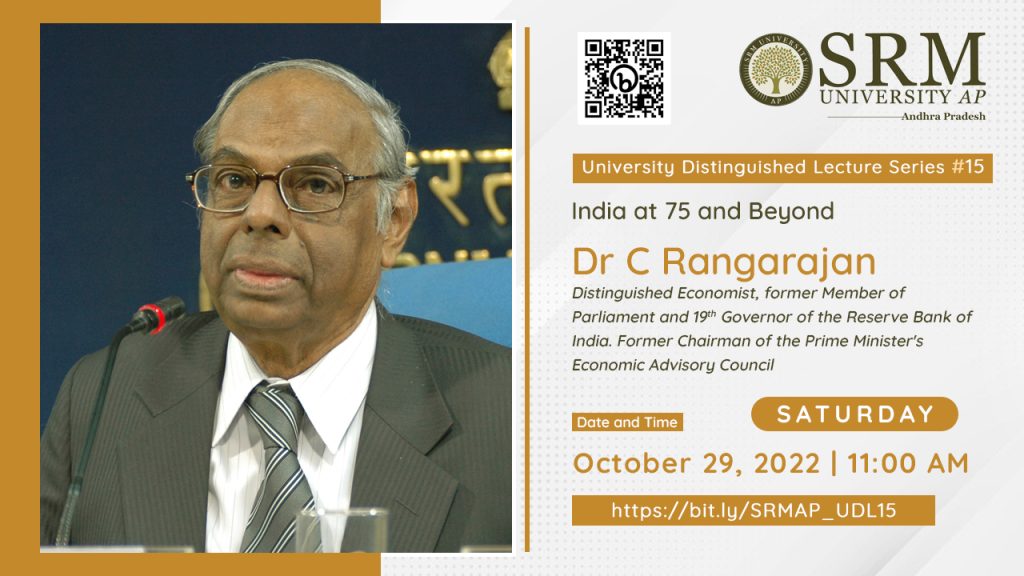 The fifteenth edition of University Distinguished Lecture series on the topic “India at 75 and beyond”, was held on October 29, 2022 to celebrate the magnificent growth displayed by India. The session was addressed by Dr C Rangarajan, renowned economist and former Governor of Reserve Bank of India. The intense and inspiring lecture highlighted the importance of reflection on the past and articulation of our vision for our future to enable rapid progression on economic development.
The fifteenth edition of University Distinguished Lecture series on the topic “India at 75 and beyond”, was held on October 29, 2022 to celebrate the magnificent growth displayed by India. The session was addressed by Dr C Rangarajan, renowned economist and former Governor of Reserve Bank of India. The intense and inspiring lecture highlighted the importance of reflection on the past and articulation of our vision for our future to enable rapid progression on economic development.Dr C Rangarajan gave a comprehensive outlook on the economic performance of India since independence. “India has made momentous progress on reducing multidimensional poverty. The incidents of multidimensional poverty were almost reduced by half to almost 27.5% during 2005-06 and 2015-16 period due to deeper progress among the poorest. Thus within 10 years, the number of poor people in India fell by more than 270 million, a truly massive achievement,” he stated during the lecture.
Dr Rangarajan further expounded on the importance of reform agendas and measures, the subsisting triad of economic policies and the future challenges of progressing into being a developed nation. The lecture was followed by a Q & A session moderated by Dr S Ananda Rao and Dr Erra Kamal Sai Sadharma from the Department Economics.
Prof Kamaiah Bandi, Dean-School of Liberal Arts and Social Sciences applauded Dr Rangarajan on being a unique distinction of shaping and motivating five generations of intellectual cohort. “Dr C Rangarajan has successfully brought down the gap between theory and practice in his capacity as Governor of RBI and various other important positions he has held for our nation. We as SRM AP look forward to your remarkable experience and knowledge to incubate motivation in our students.”
SRM University-AP has actively promoted a cumulative intellectual ecosystem and interdisciplinary education. “The principal objective of the University Distinguished Lecture series is to impel research scholars, students from all around the world to undertake progressive measures for the holistic development of our nation”, said Honourable Vice Chancellor, Prof Manoj K Arora in his welcome address.
Prof D Narayana Rao, Pro-Vice-Chancellor, SRM University-AP concluded the event by addressing Dr C Rangarajan as ‘the modern Kautilya of India’ and presented a memento on behalf of the institution as a token of respect and appreciation for his esteemed presence at the fifteenth edition of the University Distinguished Lecture series.
Continue reading → - Presented paper at the East Asian Economic Association Convention September 21, 2022
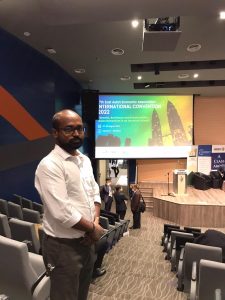
Dr J Vineesh Prakash, Assistant Professor, Department of Economics, presented a paper at the 17th East Asian Economic Association (EAEA) convention that was held on August 27-28, 2022 at Sunway University, Kuala Lumpur, Malaysia.The theme of the convention was “Growth, Resilience and Sustainability: Asian Dynamism in an Uncertain World”.
The East Asian Economic Association (EAEA) was founded in 1987 as the first international academic organisation devoted to East Asian economics. The international convention is its annual conference where papers for publication in the Asian Economic Journal are discussed.
Dr Vineesh presented the paper titled Does Business Group Affiliation Enhance Firm-Level Profitability? Evidence from Indian Automotive Component Industry, that addresses the growing competitive and volatile nature of economic sphere by testing the persistence of profit in a highly evolving emerging country environment such as India.
Emerging economies, such as India, confront different challenges than developed economies. The country has witnessed diverse regulatory environments, varying from highly regulated to more liberal ones. The more liberal environment coupled with the entry of overseas players into this realm has a definite impact on the existing industrial structure, thereby creating a volatile, ever evolving competitive environment.
The paper aims to address this issue and seeks to validate the part played by RBV in generating inimitable capabilities in a context-specific setting of a particular industry, i.e., the Indian automotive component industry. It also analyses the part played by business group affiliation in the post-reform era and its influence on profitability.
The paper found that profitability has moderate-to-high persistence and the variables, such as business group firms with overseas investments, export intensity, firm size, labour productivity growth, and past R&D intensity, have a contributory role in enhancing a firm’s profitability. Other variables such as business group affiliation, firm’s age, firm’s leverage, capital intensity, and A&M intensity have found to exercise a detrimental impact on the firm’s profitability.
Social implications of the research
The results, as reported in this paper, have some important implications for different stakeholders like managers, regulators, policymakers, etc. The finding that past R&D intensity has a positive influence on current profitability is significant to managers so they can allocate appropriate resources to fund such projects without many apprehensions.
The proof that labour productivity growth and profitability are positively related implies that managers could further focus on various in-house skill development programs to enhance labour productivity.
The finding of a positive influence of exports on profitability indicates that managers could further explore the external markets to boost up profitability as export markets are reportedly far more rewarding.
The discovery of moderate to high profit persistence has an important implication for regulators in order to facilitate healthier competition among firms. The moderate to high profitability persistence implies that the regulators have not managed to instill a reasonable level of competition in the industry through carefully crafted interventions, thereby facilitating its growth.
Continue reading → - Studying the agricultural transformation in Southeast Asia September 8, 2022
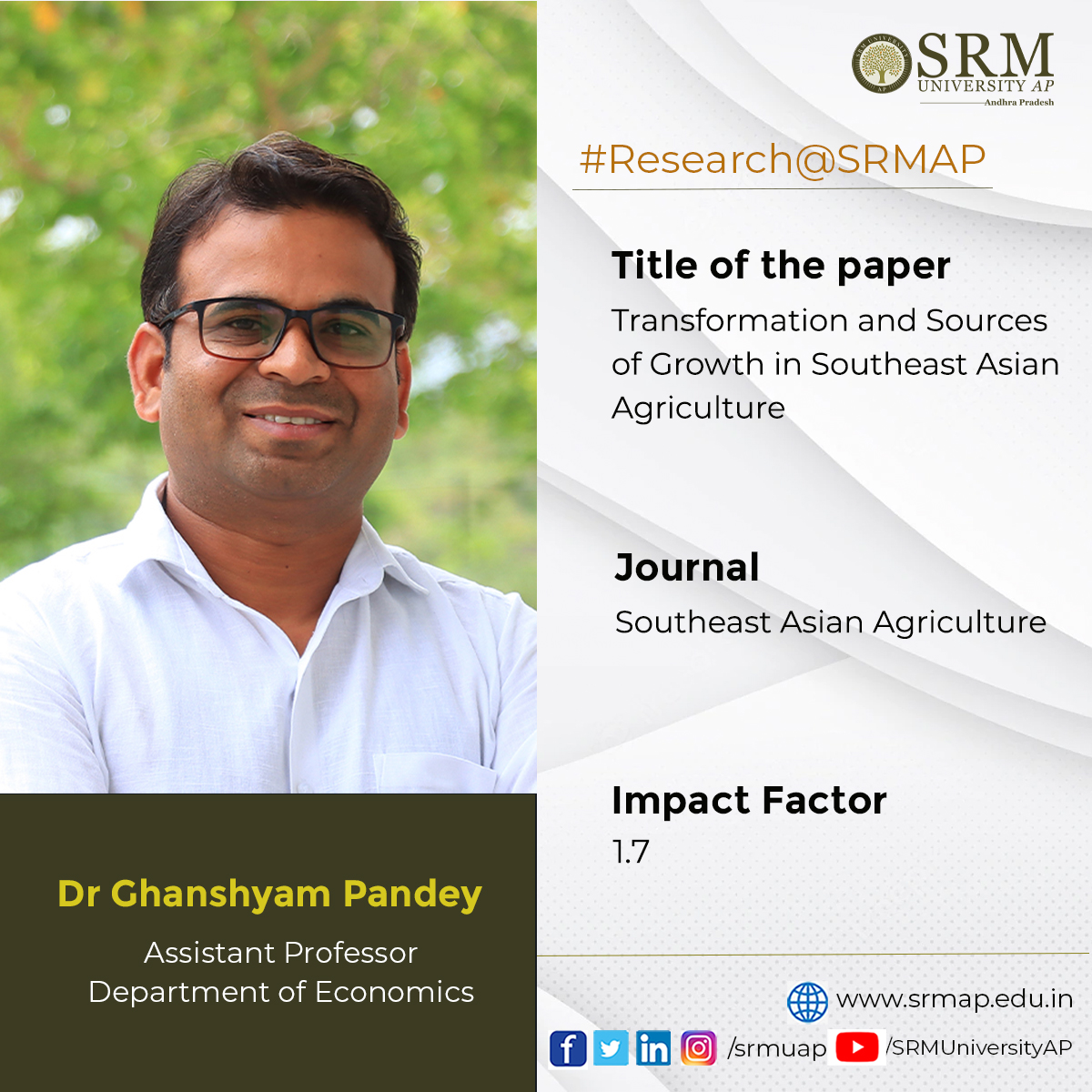
The promotion of sustainable growth of agriculture is one of the primary concerns of developing nations. The agriculture domain in Southeast Asia has undergone rapid transformation and structural changes over the last few years. Assistant Professor Dr Ghanshyam Pandey from the Department of Economics discusses the reasons for this changed scenario in his latest publication “Transformation and Sources of Growth in Southeast Asian Agriculture”. The research conducted in collaboration with International Food Policy Research (IFPRI) and the Indian Council of Agricultural Research (ICAR) was published in the Q2 journal Southeast Asian Agriculture having an Impact Factor of 1.7.
Abstract of the Research
Over the past few decades, agriculture in Southeast Asia has experienced robust growth and undergone a significant structural transformation, albeit at a different pace in different countries in the region. This paper aims to understand the agricultural transformation and growth process in Southeast Asia. The findings of this study show that driven by technological change, area expansion, and diversification, agriculture has grown faster in low-income countries in the region. In contrast, agricultural growth in high-income countries has been slow and driven by price increases, mainly of export-oriented commercial crops such as oil palm, rubber, and coconut—alongside an expansion of cropped areas under these crops. In view of the fixed supply of land and high volatility in global food prices, the area- and price-driven growth is not sustainable in the long run. For efficient, sustainable, and inclusive growth, exploiting the potential of existing and frontier technologies and diversification of production portfolios holds greater promise.
- Dr Ghanshyam Kumar Pandey to join the Editorial Board of SN Business and Economics August 4, 2022
SN Business and Economics is a multidisciplinary journal that covers the areas of Economics, Finance, Business, and Management. Springer publishes the journal. It is supported by a team of experienced in-house editors and an international Editorial board. Recently, Assistant Professor Dr Ghanshyam Kumar Pandey from the Department of Economics was appointed as a member of the editorial board of SN Business and Economics.
He is responsible for providing feedback on an ad hoc basis to the in-house editors. He is in charge of verifying submitted papers’ suitability for external review. All SN Business and Economics editors work together to ensure that the submitted research is expertly handled. The team assesses and confirms the paper to be technically sound, academically valid, and ultimately suitable for publication.
Dr Ghanshyam Kumar Pandey will be the handling Editor for up to 3 papers per quarter. This involves nominating academic referees and making an editorial recommendation following peer review. When requested, he shall give the editorial policy or strategy feedback to the Editorial team. Initially, his tenure will last for one year.
Continue reading → - IUP publications features an interview with Prof Bandi Kamaiah July 25, 2022
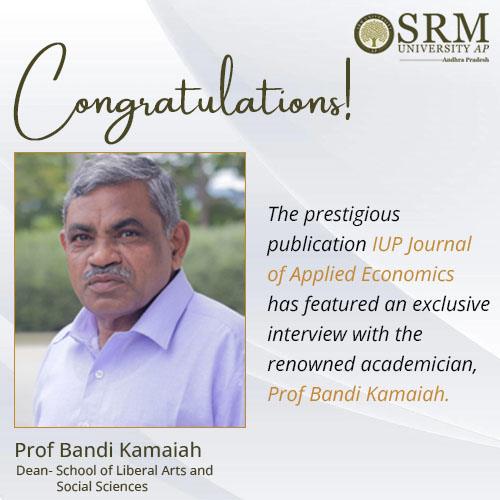
‘An interview with Professor Bandi Kamaiah’ was featured in the leading publication, IUP Journal of Applied Economics. Analysing the issues of Micro, Macro, Development and Energy economics, the journal features papers on Industrial economics, Public finance, Industry, Agricultural, Rural economics, etc. Having published interviews with eminent Professors like Professor K L Krishna, Professor Dilip Nachane, Professor U Sankar, Professor S Mahendra Dev, and Professor Ashima Goyal, the dialogue with Prof Bandi Kamaiah is the sixth in the series.
In the interview with Prof Bandi Kamaiah, Department of Economics, SRM University-AP, GRK Murty narrates the transformational journey of Prof Kamaiah from the son of a tenant farmer to an estimable researcher who went on to occupy the position of the President of ‘The Indian Econometric Society’ (TIES). The interview presents an enriching account of the veteran’s life who crossed innumerable hurdles to nurture his passion and became an ‘agent of change’ in the lives of several hundreds of first-generation students from the margins of society, by shaping them into accomplished professionals.
The evocative dialogue with Prof Kamaiah extends an open doorway to several inspiring phases of his life that modelled him into a “towering intellectual” and “outstanding teacher”. His collaboration with pre-eminent economists like Prof P R Bramhananda, Prof Dilip Nachane, and Prof C Rangarajan motivated him to build a career in monetary economics. He has successfully guided 50 PhDs and an equal number of MPhil dissertations from almost every facet of economics and published more than 160 papers in national and international journals.
The interview explicates his association with various institutes of prestige including the National Institute of Bank Management (NIBM), Indira Gandhi Institute of Development Research (IGIDR) and the University of Hyderabad. As the founding father of the School of Economics at the University of Hyderabad, he has also introduced a two-year employment-enhancing master’s program in Financial Economics. His amicable and free-spirited approach made him one of the most sought-after teachers among the student community. He has a unique way of nurturing students and guiding them through the process of academic research.
Prof Kamaiah also articulates his views on the economic landscape of the country, the possible impact of its monetary and fiscal policies in the post-pandemic scenario, the growing correlation between the domestic and global stock markets, and the deepening relationship between energy consumption, real GDP, CO2 emissions, and such other climate-related issues. Airing his concerns about the outmoded syllabus and stagnant curriculum, he reiterates the need to renovate university education, hopefully, through the framework created by NEP 2020. He believes, creating specialised institutions would be a better way to train professionals who would become market ready and employable.
In his opinion, ‘Centres of Economic Excellence’ in different regions of the country will give rise to a strong pool of economists well-trained within the country to meaningfully replace the imported economists from the West to render advice on crucial matters. “The young minds of the country should be exposed to indigenous ways of thinking, and holistically trained to appreciate our culture, resources and institutions, systems and customs, ways of living, etc. to understand local markets, expose the basis of vulgar consumerism, the beauty of self-regulation without the aid of Adam Smith’s invisible hand, and social realism in contrast to self-interest”, said Prof Kamaiah.
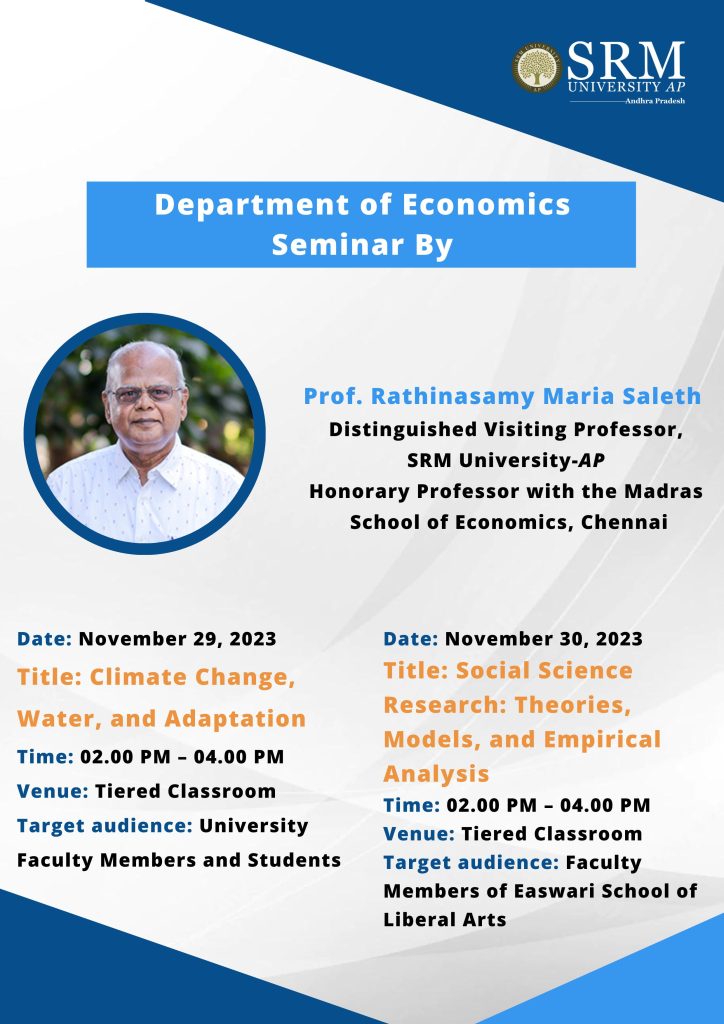
The Department of Economics is inviting Distinguished Visiting Professor, Prof. Rathinasamy Maria Saleth for two esteemed seminars on novel topics of social relevance. Prof. Saleth will talk on “Climate Change, Water, and Adaptation” on November 29, 2023, and “Social Science Research: Theories, Models, and Empirical Analysis” on November 30, 2023.
Join the sessions and gain insights from the seasoned academician!
About the Speaker
Prof. Rathinasamy Maria Saleth is currently a Distinguished Visiting Professor at the Department of Economics, Easwari School of Liberal Arts, SRM University-AP. He is regularly affiliated as an Honorary Professor at the Madras School of Economics, Chennai.
Prof. Saleth received his MA from Madurai Kamaraj University, Madurai (1979), MPhil from Jawaharlal Nehru University, New Delhi (1981), and PhD from University of Illinois, Urbana-Champaign, USA (1989). He works in the areas of water resource management, institutional change, development policy, and impact assessment and has published three books, six edited volumes, and over 100 research papers in journals and edited volumes related to these areas.
Prof. Saleth has also won awards for some of his papers, books, and works from professional organisations such as the Indian Society of Agricultural Economics, the American Water Resources Association, the International Water Association, and the University of South Australia. He has also been a consultant to the World Bank, Food and Agriculture Organisation, Asian Development Bank, UN Economic and Social Council for the Asia and the Pacific, and UN Environment Programme.
Talk 1: Climate Change, Water, and Adaptation
Abstract: This presentation covers the nature and magnitude of the impacts of climate change on water resources and possible coping and adaptation options both from global and national perspectives. The presentation starts with a discussion on the leading causes of climate change, especially the cumulative effects of global warming caused by greenhouse gases and related environmental consequences from human-induced economic activities and ecological disturbances. It, then, shows how the impacts of climate change are manifested both at the global and national scale in terms of the spatial and temporal patterns of precipitation and water availability and the resultant implications for water, agriculture, and economy. Although climate change is caused essentially by non-hydrological factors, the water sector continues to be the main medium through which most of its impacts are transmitted to the agricultural sector in particular and other economic sectors in general. As such, it is but natural for the adaptation/coping strategies also to be designed at the point of the impacted sectors, though, admittedly, general mitigation strategies go far beyond these sectors. The presentation, finally, concludes by delineating feasible adaptation strategies for the water sector, which include not just demand management options but also supply management avenues, especially those involving institutional changes and infrastructural developments.
Talk 2: Social Science Research: Theories, Models, and Empirical Analysis
Abstract: This presentation covers the theoretical, methodological, and empirical aspects of social science research, especially from the perspective of young research scholars. It starts with a discussion on the nature, rationale, features, and types of building blocks of social science theories. After an analytical description of three broad types of models, i.e., simple, interactive, and path-based models, the presentation provides concrete illustrations, particularly for the interactive and path-based models using a few empirical case studies. These illustrative case studies will show how to conceptualize, operationalize, and empirically evaluate the research problems in different contexts. The presentation, finally, concludes with the discussion on some of the additional methodological, practical, and data-related aspects of importance in social science research.
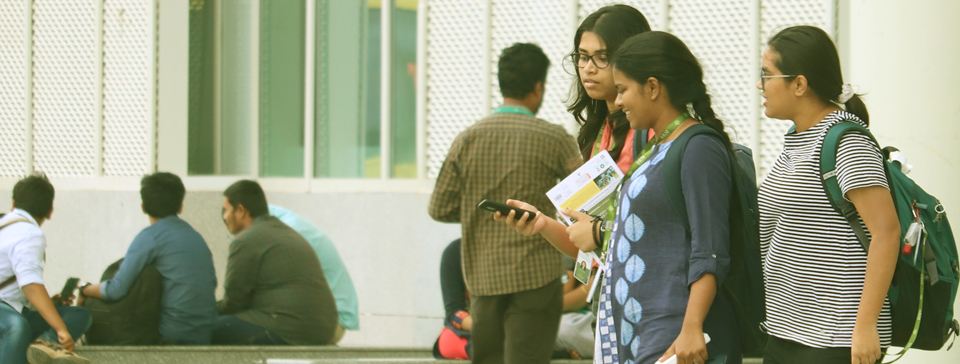
Pandey, G. (2020). “Sources and Drivers of Agricultural Growth in Jharkhand” Paper is awarded with Gold medal on Research Day at SRM University held on 29th January 2020.
Articles
Dr Ghanshyam Pandey - Budget 2023-24 is not a complete package for the Agricultural sector
Prof Balaji Vejju - Union Budget 2023: A big push for MSME sector development
Dr Manozor Hassan - Budget 2023-24 And India’s Imports, Exports, And Current Account Deficit
Md Murtaza & J vineesh Prakash - Is Gobardhan Scheme A Lasting Solution To Stubble Burning?

